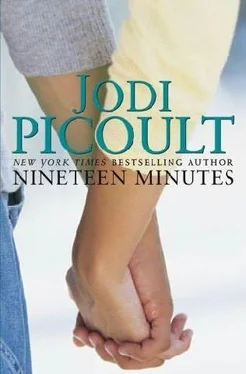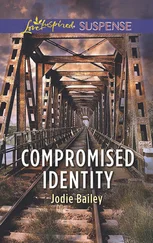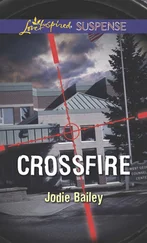She remembered how, when Peter was around eleven, he’d developed an aversion to buttons. You’d think it would be easy to get around something like that, but it eliminated most pants. Lacy could remember driving to the ends of the earth to find elastic-waist flannel plaid pajama pants that might double for daily wear. She remembered seeing kids wearing pajama bottoms to school as recently as last year and wondering if Peter had started the trend, or simply been slightly out of sync.
Even after Lacy had gathered what she needed, she continued to walk through the men’s department. She touched a rainbow of silk handkerchiefs that melted over her fingers, choosing one that was the color of Peter’s eyes. She rifled through leather belts-black, brown, stippled, alligator-and neckties printed with dots, with fleurs-de-lis, with stripes. She picked up a bathrobe that was so soft it nearly brought her to tears, shearling slippers, a cherry-red bathing suit. She shopped until the weight in her arms was as heavy as a child.
“Oh, let me help you with those,” a saleswoman said, taking some of the items from her arms and carrying them to the counter. She began to fold them, one by one. “I know how it feels,” she said, smiling sympathetically. “When my son went away, I thought I was going to die.”
Lacy stared at her. Was it possible that she wasn’t the only woman who had gone through something as awful as this? Once you had, like this salesperson, would you be able to pick others out of a crowd, as if there were a secret society of those mothers whose children cut them to the quick?
“You think it’s forever,” the woman said, “but believe me, once they come home for Christmas break or summer vacation and start eating you out of house and home again, you’ll be wishing college was year-round.”
Lacy’s face froze. “Right,” she said. “College.”
“I’ve got a girl at the University of New Hampshire, and my son’s at Rochester,” the saleswoman said.
“Harvard. That’s where my son’s going.”
They had talked about it once-Peter liked the computer science department at Stanford better, and Lacy had joked around, saying she’d throw away any brochures from colleges west of the Mississippi, because they were so far away.
The state prison was sixty miles south, in Concord.
“Harvard,” the saleswoman said. “He must be a smart one.”
“He is,” Lacy said, and she continued to tell this woman about Peter’s fictional transition to college, until the lie did not taste like licorice on her tongue; until she could nearly believe it herself.
Just after three o’clock, Josie rolled over onto her belly, spread her arms wide, and pressed her face into the grass. It looked like she was trying to hold on to the ground, which, she supposed, wasn’t all that far from the truth. She breathed in deeply-usually, she smelled nothing but weeds and soil, but every now and then when it had just rained, she got the barest scent of ice and Pert shampoo, as if Matt were still himself just under that surface.
She gathered the wrapper from her sandwich and her empty water bottle and put them into her backpack, then headed down the winding path to the cemetery gates. There was a car blocking the entrance-only twice this summer had Josie been present when a funeral procession came, and it had made her a little sick to her stomach. She started to walk faster, in the hope that she would be long gone and sitting on her Advance Transit bus before the service began-and then she realized that the car blocking the gates was not a hearse, not even black for that matter. It was the same car that had been parked in their driveway this morning, and Patrick was leaning against it with his arms crossed.
“What are you doing here?” Josie asked.
“I could ask you the same thing.”
She shrugged. “It’s a free country.”
Josie didn’t really have anything against Patrick Ducharme himself. He just made her nervous, on so many counts. She couldn’t look at him without thinking of That Day. But now she had to, because he also was her mother’s lover (how weird was it to say that?) and in a way, that was even more upsetting. Her mother was on cloud nine, falling in love, while Josie had to sneak off to a graveyard to visit her boyfriend.
Patrick pushed himself off the car and took a step toward her. “Your mother thinks you’re teaching long division right now.”
“Did she tell you to stalk me?” Josie said.
“I prefer surveillance,” Patrick corrected.
Josie snorted. She didn’t want to sound like such a snot, but she couldn’t help it. Sarcasm was like a force field; once she turned it off, he might be able to see that she was this close to falling to pieces.
“Your mother doesn’t know I’m here,” Patrick said. “I wanted to talk to you.”
“I’m going to miss my bus.”
“Then I’ll drive you wherever you want to go,” he said, exasperated. “You know, when I’m doing my job, I spend a lot of time wishing I could turn back the clock-get to the rape victim before it happened, stake out the house before the thief comes by. I know what it’s like to feel like nothing you do or say is ever going to make things better. And I know what it’s like to wake up in the middle of the night replaying one moment over and over so vividly that you might as well be living it again. In fact, I bet you and I replay the same moment.”
Josie swallowed. In all these months, out of all the well-meaning conversations she’d had with doctors and psychiatrists and even other kids from the school, no one had captured, so succinctly, what it felt like to be her. But she couldn’t let Patrick know that-couldn’t admit to her weakness, even though she had the feeling that he could spot it all the same. “Don’t pretend we have anything in common,” Josie said.
“But we do,” Patrick replied. “Your mother.” He looked Josie in the eye. “I like her. A lot. And I’d like to know that you’re okay with that.”
Josie felt her throat closing. She tried to remember Matt saying that he liked her; she wondered if anyone would ever say it again. “My mother’s a big girl. She can make her own decisions about who she f-”
“Don’t,” Patrick interrupted.
“Don’t what.”
“Don’t say something you’re going to wish you hadn’t.”
Josie stepped back, her eyes glittering. “If you think that buddying up to me is going to win her over, you’re wrong. You’re better off with flowers and chocolate. She couldn’t care less about me.”
“That’s not true.”
“You haven’t exactly been around long enough to know, have you?”
“Josie,” Patrick said, “she’s crazy about you.”
Josie felt herself choke on the truth, even harder to speak than it was to swallow. “But not as crazy as she is about you. She’s happy. She’s happy and I…I know I should be happy for her…”
“But you’re here,” Patrick said, gesturing at the cemetery. “And you’re alone.”
Josie nodded and burst into tears. She turned away, embarrassed, and then felt Patrick fold his arms around her. He didn’t say anything, and for that one moment, she even liked him-any word at all, even a well-meaning one, would have taken up the space where her hurt needed to be. He just let her cry until finally it all stopped, and Josie rested for a moment against his shoulder, wondering if this was only the eye of the storm or its endpoint.
“I’m a bitch,” she whispered. “I’m jealous.”
“I think she’d understand.”
Josie drew away from him and wiped her eyes. “Are you going to tell her I come here?”
“No.”
She glanced up at him, surprised. She would have thought that he’d take her mother’s side.
Читать дальше












